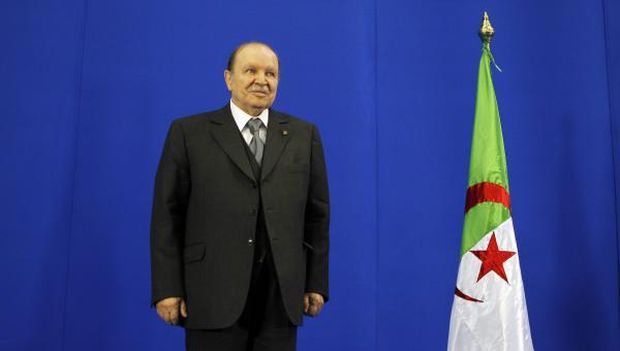
A file photo dated 08 May 2012 shows Algerian President Abdelaziz Bouteflika attending a ceremony to mark the 67th anniversary of the Setif massacre, in Setif, Algeria. (EPA/Mohamed Messara)
Prime Minister Abdelmalek Sellal’s announcement appeared to end months of speculation over Bouteflika’s future after his trips to Paris for treatment in the last year intensified talk of a succession after his 15 years in office.
Sellal said Bouteflika, who opponents believe is still too frail to govern, had decided to run and state news agency reported that he had already formally registered his candidacy.
“Bouteflika will be a candidate,” Sellal said at event in the city of Oran. “Bouteflika’s decision to run comes at the insistence of the people and after some deep reflection.”
The president himself did not appear. But state news agency APS said he had registered his candidacy with the interior ministry, 10 days before the March 4 deadline to do so.
A political transition in the major energy supplier to Europe would have come at a sensitive time with neighbors Egypt and Libya still deep in turmoil three years after popular uprisings ousted their veteran rulers.
Backed by the ruling National Liberation Front (FLN) party, unions and other FLN allies, Bouteflika, 76, is almost sure to be re-elected, with opposition candidates unlikely to offer a serious challenge.
Loyalists see Bouteflika as the man who gave Algeria peace and economic stability after a civil war with Islamists in the 1990s that killed about 200,000 people. Many Algerians are wary of any upheaval after that bloody experience.
Opposition is still weak in Algeria. Since independence from France in 1962, senior FLN leaders and military officers, known in French as “Le Pouvoir (The Power)”, have dominated politics, tussling among themselves for influence behind the scenes.
Since his stroke first put him in a Paris clinic last year, there was speculation about whether Bouteflika was healthy enough to run for re-election. A second visit to Paris in January for checkups prompted another round of succession talk.
Sellal said the president was in good health, and had all the “intellectual abilities and necessary vision”, APS reported.
“He does not need to campaign himself, there are men who can campaign for him,” the prime minister said.
But critics say Bouteflika, rarely seen in public since he returned from France, should let a new generation take over.
One opposition leader had even called for Bouteflika to show his medical records before seeking office again.
“The evidence Bouteflika is ill is that he is not even able to make the announcement himself that he will run for a fourth term,” Abdallah Djaballah, leader of the Algerian Islamic party, told reporters, calling for a boycott of the election.
In the short term, a Bouteflika mandate means stability for a partner in a US-led campaign against Islamist militants in a region still struggling with unrest after revolts in other North African nations.
But Algeria also needs serious economic reform to attract more investment in its flagging oil and gas sector and to reduce restrictions on non-oil investment in an economy shaking off years of centralized control.
An Islamist militant attack on an Algerian gas plant killed nearly 40 foreign workers a year ago, worrying foreign oil companies already concerned about the terms Algeria has demanded in the past for its contracts.
Since late last year, Bouteflika started shoring up his position by curtailing the influence of the chief of the DRS military intelligence agency, who in the past played political kingmaker.
Last month, the government sacked two DRS intelligence generals, in charge of domestic security and counter-terrorism, and a colonel, as Bouteflika’s faction strengthened its hand against the military’s influence.
